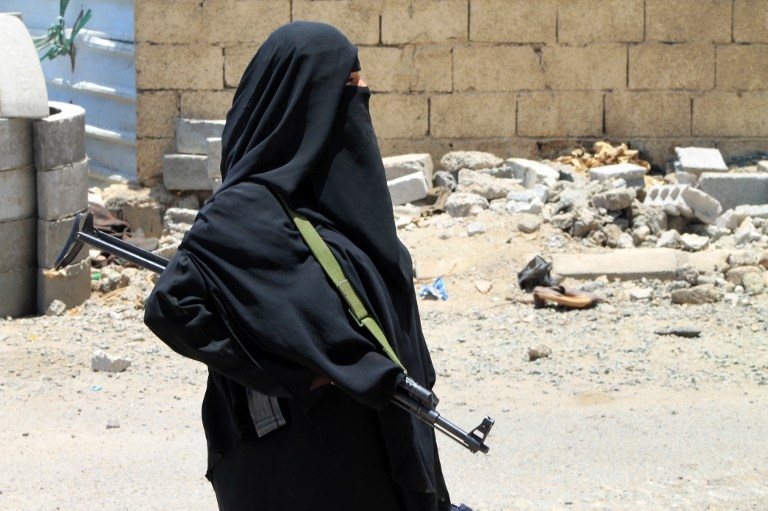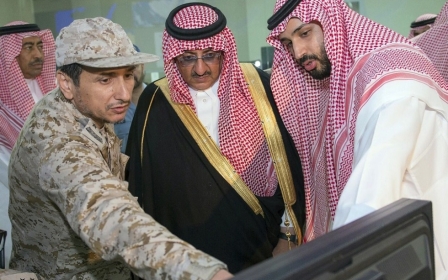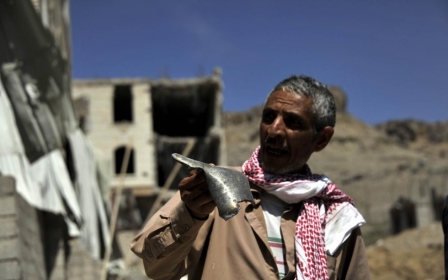Yemen: Separatists will not lay down weapons even if airstrikes end

AL MUKALLA, Yemen - South Yemen separatists are vowing to continue fighting the Houthis and allied forces even if the Saudi-led coalition stops its airstrikes.
"The southern [armed] resistance will not stop until driving out all the new and old Yemeni invaders like the Houthis and deposed president's [Saleh] forces from the south," Ali Haitham al-Ghouraib, a leading member of the Southern Movement, told Middle East Eye.
The widespread promise to keep fighting further puts into doubt hopes that violence in the impoverished country might be coming to an end.
Separatists have engaged in fierce battles with the forces of the Houthis and former Yemeni president Ali Abdullah Saleh since the group advanced to the restive south in March to topple deposed president Abd Rabbuh Mansour Hadi. Their drive prompted Saudi Arabia, backed by an alliance of Arab states, to launch a military campaign which has seen at least 3,200 bombs dropped on Yemen since 26 March.
On Tuesday, a Saudi spokesperson said that the Saudi-led Operation Decisive Storm would halt its air campaign and begin a new campaign dubbed Operation Restore Hope. However, despite the statements, the airstrikes quickly resumed and are continuing on several locations including Sanaa, Aden and Taiz. But while the attacks have continues to make headlines, the ongoing tensions on the ground and pledges by the leaders of the Southern Movement - a loose term for factions that call for the independence of what was formerly called South Yemen - to keep fighting on regardless of what Rhyaud and its coalition does, could mean that peace could be further away than many had expected.
South Yemen Movement
Tribal-dominated Northern Yemen, which became a state after the collapse of the Ottoman Empire in November 1918, and Marxist-led Southern Yemen, that gained its independence in 1967 after a local revolt against 128 years of British rule, were unified in 1990.
After unification, however, tensions between factions in the northern and southern camps erupted, leading to a civil war that lasted for several months in 1994 in which thousands of people were killed.
Once the hostilities ended, thousands of army officers and public servants in the defeated south were forced into retirement, spawning future resentment.
In subsequent years, rallies of dissatisfied southerners gained momentum. Many complained that they had lost out to the well-connected northerners who had made systematic land grabs.
Though the south is home to only a fifth of Yemen's 22 million people, it generates the majority of Yemen’s wealth. Up to 80 percent of oil production is in the south, while Aden’s rich fisheries, port and refinery are a hub of economic activity.
In 2007, Yemen’s pro-secessionist sentiment in the south was fully rekindled when thousands of armed officers and public servants, frustrated by the disparate wealth and power of the northerners, took to the streets of Aden and the Southern Movement or Hirak - a loose term for the southern-based factions that opposed the regime of former president Saleh – was born.
Peace to arms
For years, the separatists have stuck to peaceful means of resistance despite ruthless crackdowns by Yemeni forces under Saleh. But southern leaders say their strategy has now changed.
"We have moved from a peaceful resistance into an armed one and will not stop until we liberate the south from the northerners," Nasser al-Fadheli, another leading separatist figure, told MEE from Aden.
To the disappointment of the separatists, deposed president Hadi - in a televised speech on Wednesday from the Saudi capital where he fled last month - said he was determined to rebuild a "new Yemen" based on the outcomes of the transitional talks that approved dividing the country into six semi-autonomous regions in 2014. Hadi also called upon the country's fragmented armed forces to back his legitimacy.
"With all due respect to those who repeatedly talk about legitimacy, we would like to say no one in the south is fighting for [Hadi's] legitimacy. People are fighting for liberation and independence," Fadheli said.
South Yemen separatists - also widely known as Hirak - say that the ongoing military operations in the south have brought various factions of the movement together after years of long-standing differences amongst leaders who fought for power in 1986.
"All factions in the south are collectively fighting the Houthis and Saleh's forces," Ghouraib said.
In the past two days, media reports said the Houthis have agreed to join peace talks after the termination of airstrikes in Yemen. The separatists say that they have one condition for joining any peace negotiations: the recognition of their demand for the reestablishment of their own state in south Yemen.
"We are ready to take part in any settlement if the peaceful and armed resistances were recognised. Our version is that the armed resistance will continue if the southern issue is not included in any settlement in future," Ghouraib said.
Fadheli added: "The regional community will not enjoy peace and stability if the southerners do not achieve their right of independence and liberation."
New MEE newsletter: Jerusalem Dispatch
Sign up to get the latest insights and analysis on Israel-Palestine, alongside Turkey Unpacked and other MEE newsletters
Middle East Eye delivers independent and unrivalled coverage and analysis of the Middle East, North Africa and beyond. To learn more about republishing this content and the associated fees, please fill out this form. More about MEE can be found here.




